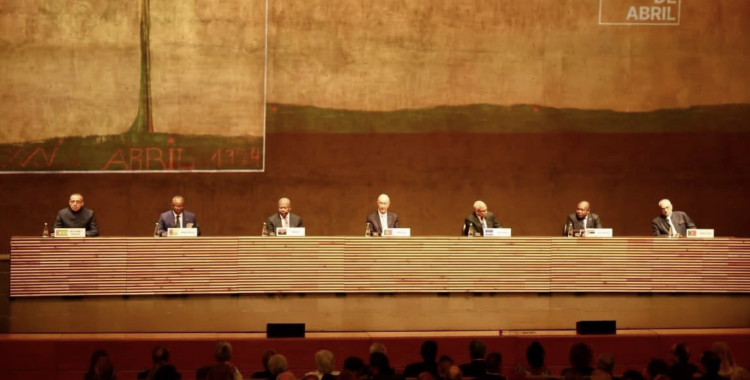When speaking at the session commemorating the 50th anniversary of the 25th of April 1974, with the heads of state of Portugal and the former Portuguese colonies, whose independence was linked to the 25th of April, he began his intervention with a salute to the overthrow of "the Salazar dictatorship, responsible for the oppression not only of the Portuguese people but also of the people of the then Portuguese colonies".
"We recognize the courage and heroism of the Abril captains and the Portuguese resisters who fought by all means and means against the dictatorship, facing the regime's oppressive machine, the PIDE/DGS and its appendages, which did not shy away from torturing and killing the best children of this land", he highlighted.
João Lourenço stressed that while Portugal was fighting "against fascism and the Salazar dictatorship since 1932", the African people colonized by Portugal had been fighting since the 15th century "against Portuguese colonization and its consequences such as slavery and the pillaging" of wealth.
"We fought for an end to the abuses, crimes and violations of human rights committed by the colonialist regime against our people for centuries. We fought for our dignity as human beings that we are, who must have the same right to freedom, the right to be the masters of our own destiny", he stressed.
The President drew the parallel between the fight against the dictatorship, in Portugal, and the armed struggles for the independence of the former colonies, concluding that "they precipitated the events that led to the uprising and military coup on April 25, 1974 in Portugal".
"Our cause was the same as that of the Portuguese people and, therefore, together we fought and together we defeated the same enemy, colonialism and the fascist dictatorship of Salazar and Caetano", he highlighted.
Joao Lourenço then hailed the "fraternal ties of friendship" between the people of Portugal and the former colonies, at the same time that "a fruitful and mutually advantageous economic cooperation" was established.
João Lourenço also warned of the dangers "of the growth and proliferation of extremist movements, xenophobia, neo-Nazism, political intolerance and religious fundamentalism, terrorism, which threaten democracies and seek, through democratic means in some cases but, above all, through unconstitutional methods and paths, come to power".
"Let us once again join together our will and energies to face and defeat these negative forces that today appear in new guises, but which threaten the fundamental freedoms of citizens, human life and the social progress of nations", he proposed.
At the international level, the President assertively condemned the Russian invasion of Ukraine and reaffirmed his defense of the creation of the State of Palestine.
"We, who fought for the freedom we celebrate today, have a moral duty to condemn the aggression, occupation and annexation of Ukrainian territories by Russia and to demand respect for the sovereignty and territorial integrity of Ukraine and that the necessary diplomatic efforts be made so that definitive peace in Ukraine and in Europe in general is achieved", he stated.
After condemning the "terrorist action" perpetrated by the Palestinian Islamist movement Hamas, on October 7, "which killed thousands of peaceful Israeli citizens and took hundreds of hostages, who must be released", the President also condemned the "disproportionate reaction " of Israel.
Recognizing the right of the Jewish State to defend its citizens, João Lourenço said that Israel "cannot have carte blanche, a green light to indiscriminately kill children, women, old people, bedridden patients, journalists and workers from international humanitarian organizations".
The session commemorating the 50th anniversary took place at the Belém Cultural Center and was chaired by the Portuguese President, Marcelo Rebelo de Sousa, with the presence also of the President of the Assembly of the Republic, José Pedro Aguiar-Branco, and the heads of State of Cabo Verde, José Maria Neves, from Guinea-Bissau, Umaro Sissoco Embaló, from Mozambique, Filipe Nyusi, from São Tomé and Príncipe, Carlos Vila Nova, and from Timor-Leste, José Ramos-Horta.







